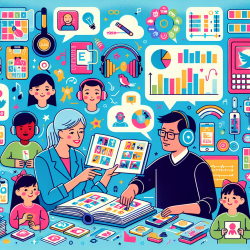In today's educational landscape, literacy is a crucial skill that unlocks a world of opportunities. For students with intellectual disabilities who require augmentative and alternative communication (AAC), acquiring literacy skills can be particularly challenging. However, recent research has shown promising strategies that can make a significant difference.
A study titled "Reading intervention for students with intellectual disabilities without functional speech who require augmentative and alternative communication: a multiple single-case design with four randomized baselines" offers valuable insights. This research focuses on delivering reading instructions to non-verbal or minimally verbal students aged 6-14 with intellectual disabilities, aiming to enhance their literacy skills through a structured reading program.
Key Findings and Recommendations
The study employed a multiple single-case design with four randomized baselines and involved 40 students. The intervention was based on the Accessible Literacy Learning (ALL) program, developed by Janice Light and David McNaughton. The program includes various components such as phonological awareness, letter-sound correspondence, phoneme segmentation, shared reading, recognition of sight words, and decoding.
Here are some key findings and recommendations from the study:
- Sound Blending: Students showed significant improvement in their ability to blend sounds to form words. Educators should incorporate explicit instruction in sound blending as part of their literacy curriculum.
- Letter-Sound Correspondence: The study found that teaching letter-sound correspondence systematically and explicitly led to better reading outcomes. Teachers should focus on this foundational skill to enhance decoding abilities.
- Phoneme Segmentation: Students benefited from activities that involved breaking down words into individual phonemes. This skill is crucial for both reading and spelling.
- Recognition of Sight Words: Combining phonological reading with sight word recognition proved to be effective. Educators should balance both approaches to maximize literacy gains.
- Decoding: The ability to decode words by recognizing letters, associating them with sounds, and blending them was significantly improved through the intervention. Consistent practice in decoding should be emphasized.
Practical Implementation
To implement these findings in your educational practice, consider the following steps:
- Adopt Evidence-Based Programs: Utilize programs like Accessible Literacy Learning (ALL) that have been proven effective for students with intellectual disabilities who require AAC.
- Provide Teacher Training: Ensure that teachers receive adequate training in delivering reading interventions. This includes understanding the specific needs of students who use AAC and how to adapt instructions accordingly.
- Use Multi-Component Interventions: Incorporate various components such as phonological awareness, letter-sound correspondence, and decoding into your literacy instruction. A multi-component approach is more effective than focusing on a single skill.
- Monitor Progress: Regularly assess students' progress using reliable measures. Adjust interventions based on data to ensure continuous improvement.
- Encourage Further Research: While this study provides valuable insights, more research is needed to understand the long-term effects of these interventions and their applicability in different settings. Educators should stay informed about the latest research and adapt their practices accordingly.
By incorporating these strategies, educators can make a significant impact on the literacy skills of students with intellectual disabilities who require AAC. The ability to read not only enhances communication but also opens up a world of opportunities for these students.
To read the original research paper, please follow this link: Reading intervention for students with intellectual disabilities without functional speech who require augmentative and alternative communication: a multiple single-case design with four randomized baselines.










